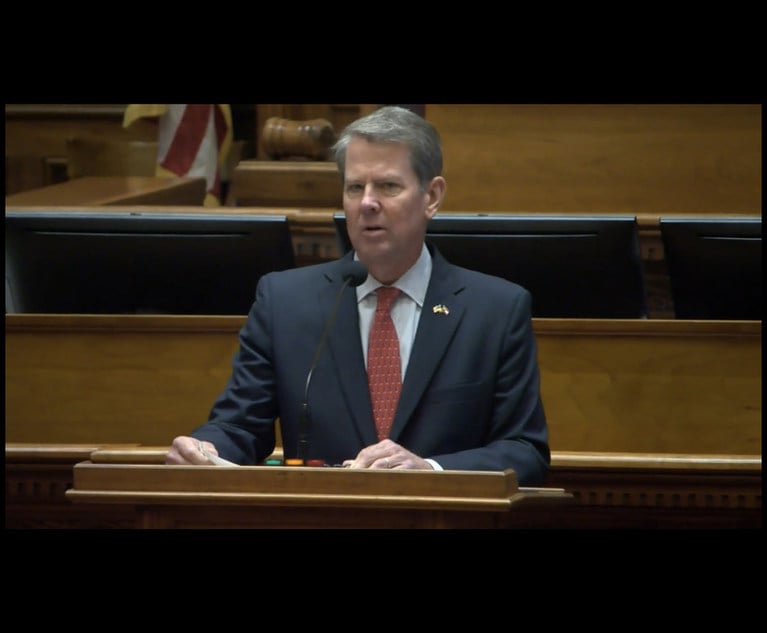Courthouses Close Anew as Staff, Judges Test Positive for COVID-19
Courthouses where workers have tested positive include Fulton, Cobb, Henry, Douglas, Gilmer, Fannin and Ware counties.
July 09, 2020 at 04:03 PM
6 minute read
 Judges Chris Brasher (left) and Ben Studdard. (Photos: Courtesy and John Disney/ALM)
Judges Chris Brasher (left) and Ben Studdard. (Photos: Courtesy and John Disney/ALM)
Some courthouses across Georgia are closing again as employees and judges who had begun restoring court operations have tested positive for COVID-19.
On Tuesday, Superior Court Chief Judge Brenda Weaver of the Appalachian Judicial Circuit issued an emergency order shutting the courthouses in North Georgia's Gilmer and Fannin counties. Gilmer County Probate Judge Scott Chastain has tested positive for the virus, said Kevin Holder, executive director of the state Council of Probate Court Judges.
Weaver's order said that "a number of courthouse employees" are displaying COVID-19 symptoms, have been tested and are awaiting results. She said she and the chairs of the two county commissions decided it was "no longer feasible" for judicial offices in those courthouses to remain open.
Weaver ordered deep cleaning of all court and clerk offices, as well as offices of the district attorney and the Court Appointed Special Advocate.
On Tuesday, Ware County Superior Court Chief Judge Dwayne Gillis declared a judicial emergency shutting down the southeast Georgia probate court through July 19 after Probate Judge Calvin Bennett and members of his family and staff tested positive for COVID-19.
Cobb County Probate Judge Kelli Wolk, president of the Council of Probate Court Judges, said a total of six probate judges have tested positive for the virus. One of them, Dougherty County Probate Judge Nancy Stephenson, in Albany, died April 1.
Metro Atlanta courthouses have not been immune from the virus. In Henry County, the justice center—which houses the state, magistrate and juvenile courts— remains closed through July 10 after six court personnel, including two judges, tested positive for the virus.
Henry County State Court Judge Ben Studdard confirmed this week that he is one of a handful of court employees who work in the justice center who tested positive for COVID-19, leading to the justice center's closure on July 1. Superior Court Chief Judge Brian Amero said a second judge and four sheriff's deputies assigned to the justice center also tested positive for the virus. Amero declined to identify either the court or the judge, citing potential medical privacy issues.
Studdard said he tested positive two weeks ago after experiencing "very slight symptoms." The judge said that normally he wouldn't have considered his symptoms—which disappeared within a day—as serious enough to warrant a doctor's visit. "But I felt I owed it to those around me to take the test, and I wanted to set a good example," he said. "I was surprised to get a positive result."
Studdard said he self-quarantined until last Friday, 10 days after he tested positive and in consultation with health department officials. "I am grateful to have had the mildest of cases," he said.
The state Department of Public Health will make COVID-19 testing available for everyone who works in the building on Thursday, and those with negative tests may return to work on Monday, he said.
Studdard said that Henry County courts resumed operations in May "with strict health screening, distancing, and masking and with multiple small court sessions" after nearly two months in which all but emergency and some essential operations were suspended. Virtual proceedings were also conducted, he said.
"That felt like a revolution, but now we're working to offer virtual options for everything and encouraging everyone to use them," he said. We have important work to do, but we want to do it in the safest way we can."
"We all should be more vigilant," Studdard added. "I'm truly frightened by the number of people I'm hearing about going to the beach over the holidays. Our numbers in Georgia began jumping after Memorial Day; I can only imagine it getting even worse two weeks from now."
In Douglas County, employees with clerks' offices for the county's juvenile, state, superior, probate and magistrate courts were asked to self-isolate and work from home after a county juvenile court employee with COVID-19 symptoms who had multiple contacts with other clerks in every office tested positive for the virus, Superior Court Chief Judge David Emerson said.
In Cobb County, seven employees in the county judicial complex have tested positive for the virus, including one of her license clerk, Wolk said. Those who were in close contact with staff who tested positive have been encouraged–but have not been required–by the county to be tested for the virus.
Fulton County Superior Court Judge Christopher Brasher said that six courthouse employees–four working for the superior court clerk and two who work for the county sheriff in his courthouse office–have tested positive for COVID-19. Several other employees are suspected to have the virus but are awaiting test results. Half of those people were on home-work rotation, Brasher said. The others didn't hold jobs that involved public interaction.
The positive employees and any one who had contact with them have been quarantined for two weeks and will not be permitted back in the courthouse until they have tested negative, he said. The county is also conducting contact tracing, he added.
This week, Brasher said that, while some nonessential operations, including some in-person hearings, have resumed, "We have reached a point where maybe things need to stay where they are for a while."
"We have done what we can to implement guidelines for reopening, to provide options," he added. "We need to not push past that point," especially because members of the legal community are beginning to express concerns about compelled court appearances.
"I have encouraged my colleagues and to good effect to always provide the option for folks who don't want to appear in person to be able to do that," he said. "Some things we are just not going to be able to do."
The spate of new judicial orders closing courthouses that have been working to reinstate operations suspended since March comes as Georgia Supreme Court Justice Harold Melton prepares to extend a statewide judicial emergency for at least another month. At a meeting of the state Judicial Council on Monday, Melton warned that judges who were failing to abide by the conditions of his orders about pandemic operations or follow state health department mandates could face disciplinary action by the state judicial watchdog agency.
This content has been archived. It is available through our partners, LexisNexis® and Bloomberg Law.
To view this content, please continue to their sites.
Not a Lexis Subscriber?
Subscribe Now
Not a Bloomberg Law Subscriber?
Subscribe Now
NOT FOR REPRINT
© 2025 ALM Global, LLC, All Rights Reserved. Request academic re-use from www.copyright.com. All other uses, submit a request to [email protected]. For more information visit Asset & Logo Licensing.
You Might Like
View All
Panel to Decide if Governor Should Suspend Georgia Lawyer From Elected Post
4 minute read

Plaintiffs Attorneys Awarded $113K on $1 Judgment in Noise Ordinance Dispute
4 minute readTrending Stories
- 1Decision of the Day: Court Holds Accident with Post Driver Was 'Bizarre Occurrence,' Dismisses Action Brought Under Labor Law §240
- 2Judge Recommends Disbarment for Attorney Who Plotted to Hack Judge's Email, Phone
- 3Two Wilkinson Stekloff Associates Among Victims of DC Plane Crash
- 4Two More Victims Alleged in New Sean Combs Sex Trafficking Indictment
- 5Jackson Lewis Leaders Discuss Firm's Innovation Efforts, From Prompt-a-Thons to Gen AI Pilots
Who Got The Work
J. Brugh Lower of Gibbons has entered an appearance for industrial equipment supplier Devco Corporation in a pending trademark infringement lawsuit. The suit, accusing the defendant of selling knock-off Graco products, was filed Dec. 18 in New Jersey District Court by Rivkin Radler on behalf of Graco Inc. and Graco Minnesota. The case, assigned to U.S. District Judge Zahid N. Quraishi, is 3:24-cv-11294, Graco Inc. et al v. Devco Corporation.
Who Got The Work
Rebecca Maller-Stein and Kent A. Yalowitz of Arnold & Porter Kaye Scholer have entered their appearances for Hanaco Venture Capital and its executives, Lior Prosor and David Frankel, in a pending securities lawsuit. The action, filed on Dec. 24 in New York Southern District Court by Zell, Aron & Co. on behalf of Goldeneye Advisors, accuses the defendants of negligently and fraudulently managing the plaintiff's $1 million investment. The case, assigned to U.S. District Judge Vernon S. Broderick, is 1:24-cv-09918, Goldeneye Advisors, LLC v. Hanaco Venture Capital, Ltd. et al.
Who Got The Work
Attorneys from A&O Shearman has stepped in as defense counsel for Toronto-Dominion Bank and other defendants in a pending securities class action. The suit, filed Dec. 11 in New York Southern District Court by Bleichmar Fonti & Auld, accuses the defendants of concealing the bank's 'pervasive' deficiencies in regards to its compliance with the Bank Secrecy Act and the quality of its anti-money laundering controls. The case, assigned to U.S. District Judge Arun Subramanian, is 1:24-cv-09445, Gonzalez v. The Toronto-Dominion Bank et al.
Who Got The Work
Crown Castle International, a Pennsylvania company providing shared communications infrastructure, has turned to Luke D. Wolf of Gordon Rees Scully Mansukhani to fend off a pending breach-of-contract lawsuit. The court action, filed Nov. 25 in Michigan Eastern District Court by Hooper Hathaway PC on behalf of The Town Residences LLC, accuses Crown Castle of failing to transfer approximately $30,000 in utility payments from T-Mobile in breach of a roof-top lease and assignment agreement. The case, assigned to U.S. District Judge Susan K. Declercq, is 2:24-cv-13131, The Town Residences LLC v. T-Mobile US, Inc. et al.
Who Got The Work
Wilfred P. Coronato and Daniel M. Schwartz of McCarter & English have stepped in as defense counsel to Electrolux Home Products Inc. in a pending product liability lawsuit. The court action, filed Nov. 26 in New York Eastern District Court by Poulos Lopiccolo PC and Nagel Rice LLP on behalf of David Stern, alleges that the defendant's refrigerators’ drawers and shelving repeatedly break and fall apart within months after purchase. The case, assigned to U.S. District Judge Joan M. Azrack, is 2:24-cv-08204, Stern v. Electrolux Home Products, Inc.
Featured Firms
Law Offices of Gary Martin Hays & Associates, P.C.
(470) 294-1674
Law Offices of Mark E. Salomone
(857) 444-6468
Smith & Hassler
(713) 739-1250







